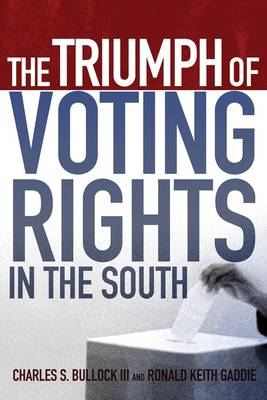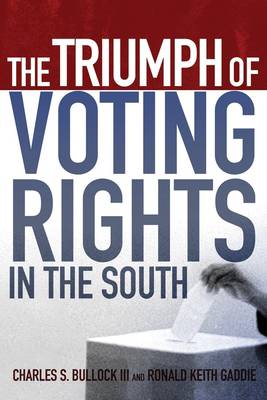
- Afhalen na 1 uur in een winkel met voorraad
- Gratis thuislevering in België vanaf € 30
- Ruim aanbod met 7 miljoen producten
- Afhalen na 1 uur in een winkel met voorraad
- Gratis thuislevering in België vanaf € 30
- Ruim aanbod met 7 miljoen producten
Zoeken
€ 45,95
+ 91 punten
Omschrijving
The Voting Rights Act of 1965 achieved what two constitutional amendments and three civil rights acts could not: giving African Americans in the South access to the ballot free from restriction or intimidation. The most exhaustive treatment of elections and race in the region in sixty years, The Triumph of Voting Rights in the South explores the impact of that landmark legislation and highlights lingering concerns about minority political participation. In this state-by-state assessment, Charles S. Bullock III and Ronald Keith Gaddie show how minorities have become politically empowered thanks to the act--particularly its Section 5 provision, which requires jurisdictions that have had low levels of minority voting to obtain federal clearance before altering election laws. Blending data and anecdote, the authors demonstrate how minority participation in politics has improved as measured by voter registration and turnout, election of African Americans to political office, and minorities' success in electing preferred candidates. Eleven southern states are discussed, including Arkansas and Tennessee, where Section 5 was not implemented, and Florida and Texas, where the act takes into account Latino participation. Concluding chapters offer a comparative assessment of voting rights progress across the South, explore the political by-products of the act, and analyze the 2008 election of President Barack Obama in light of wider access to the polls. The authors also discuss whether Section 5, set to expire in 2031, will be needed any longer. Political scientists, historians, students, and all those interested in southern politics and minority voting rights will find this study rich in information and insight as it shows how race and party interact in the modern South.
Specificaties
Betrokkenen
- Auteur(s):
- Uitgeverij:
Inhoud
- Aantal bladzijden:
- 448
- Taal:
- Engels
Eigenschappen
- Productcode (EAN):
- 9780806140797
- Verschijningsdatum:
- 16/11/2009
- Uitvoering:
- Hardcover
- Formaat:
- Genaaid
- Afmetingen:
- 152 mm x 229 mm
- Gewicht:
- 750 g

Alleen bij Standaard Boekhandel
+ 91 punten op je klantenkaart van Standaard Boekhandel
Beoordelingen
We publiceren alleen reviews die voldoen aan de voorwaarden voor reviews. Bekijk onze voorwaarden voor reviews.











